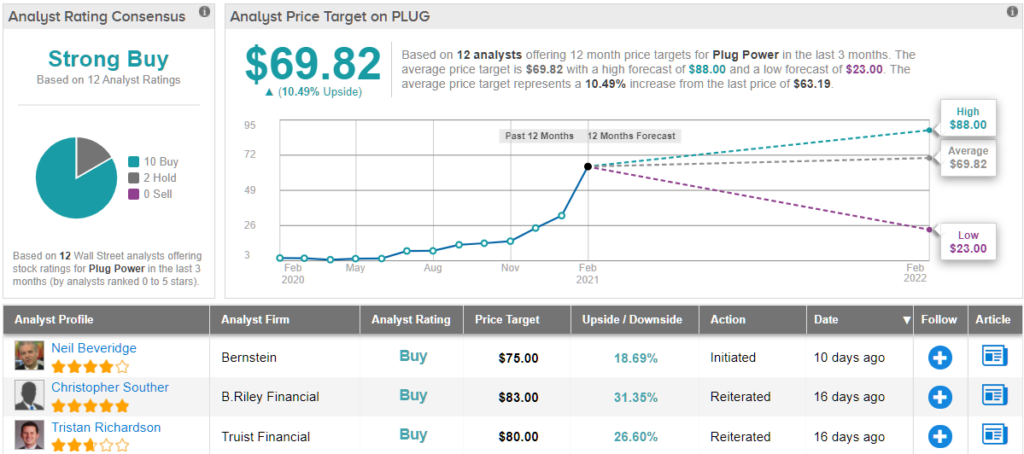Plug Power: An Expensive Stock – but This Analyst Still Loves It
Bloomberg
A Crypto Kid Had a $23,000-a-Month Condo. Then the Feds Came
(Bloomberg) — Stefan Qin was simply 19 when he claimed to have the key to cryptocurrency buying and selling.Buoyed with youthful confidence, Qin, a self-proclaimed math prodigy from Australia, dropped out of school in 2016 to start out a hedge fund in New York he referred to as Virgil Capital. He advised potential purchasers he had developed an algorithm referred to as Tenjin to observe cryptocurrency exchanges around the globe to grab on worth fluctuations. Slightly greater than a 12 months after it began, he bragged the fund had returned 500%, a declare that produced a flurry of recent cash from buyers.He grew to become so flush with money, Qin signed a lease in September 2019 for a $23,000-a-month condominium in 50 West, a 64-story luxurious apartment constructing within the monetary district with expansive views of decrease Manhattan in addition to a pool, sauna, steam room, sizzling tub and golf simulator.In actuality, federal prosecutors mentioned, the operation was a lie, primarily a Ponzi scheme that stole about $90 million from greater than 100 buyers to assist pay for Qin’s lavish way of life and private investments in such high-risk bets as preliminary coin choices. At one level, going through consumer calls for for his or her cash, he variously blamed “poor cash flow management” and “loan sharks in China” for his troubles. Last week, Qin, now 24 and expressing regret, pleaded responsible in federal courtroom in Manhattan to a single depend of securities fraud.“I knew that what I was doing was wrong and illegal,” he advised U.S. District Judge Valerie E. Caproni, who may sentence him to greater than 15 years in jail. “I deeply regret my actions and will spend the rest of my life atoning for what I did. I am profoundly sorry for the harm my selfish behavior has caused to my investors who trusted in me, my employees and my family.”Eager InvestorsThe case echoes comparable cryptocurrency frauds, equivalent to that of BitConnect, promising folks double-and triple-digit returns and costing buyers billions. Ponzi schemes like that present how buyers wanting to money in on a sizzling market can simply be led astray by guarantees of huge returns. Canadian trade QuadrigaCX collapsed in 2019 because of fraud, inflicting no less than $125 million in losses for 76,000 buyers.While regulatory oversight of the cryptocurrency trade is tightening, the sector is affected by inexperienced individuals. Plenty of the 800 or so crypto funds worldwide are run by folks with no information of Wall Street or finance, together with some school college students and up to date graduates who launched funds a number of years in the past.Qin’s path began in school, too. He had been a math whiz who deliberate on changing into a physicist, he advised an internet site, DigFin, in a profile revealed in December, only a week earlier than regulators closed in on him. He described himself on his LinkedIn web page as a “quant with a deep interest and understanding in blockchain technology.”In 2016, he gained acceptance right into a program for high-potential entrepreneurs on the University of New South Wales in Sydney with a proposal to make use of blockchain know-how to hurry up international trade transactions. He additionally attended the Minerva Schools, a principally on-line school based mostly in San Francisco, from August 2016 via December 2017, the college confirmed.Crypto BugHe acquired the crypto bug after an internship with a agency in China, he advised DigFin. His activity had been to construct a platform between two venues, one in China and the opposite within the U.S., to permit the agency to arbitrage cryptocurrencies.Convinced he had occurred upon a enterprise, Qin moved to New York to discovered Virgil Capital. His technique, he advised buyers, can be to take advantage of the tendency of cryptocurrencies to commerce at totally different costs at varied exchanges. He can be “market-neutral,” which means that the agency’s funds wouldn’t be uncovered to cost actions.And in contrast to different hedge funds, he advised DigFin, Virgil wouldn’t cost administration charges, taking solely charges based mostly on the agency’s efficiency. “We never try to make easy money,” Qin mentioned.By his telling, Virgil acquired off to a quick begin, claiming 500% returns in 2017, which introduced in additional buyers wanting to take part. A advertising and marketing brochure boasted of 10% month-to-month returns — or 2,811% over a three-year interval ending in August 2019, authorized filings present.His property acquired an additional jolt after the Wall Street Journal profiled him in a February 2018 story that touted his talent at arbitraging cryptocurrency. Virgil “experienced substantial growth as new investors flocked to the fund,” prosecutors mentioned.Missing AssetsThe first cracks appeared final summer season. Some buyers had been changing into “increasingly upset” about lacking property and incomplete transfers, the previous head of investor relations, Melissa Fox Murphy, mentioned in a courtroom declaration. (She left the agency in December.) The complaints grew.“It is now MID DECEMBER and my MILLION DOLLARS IS NOWHERE TO BE SEEN,” wrote one investor, whose title was blacked out in courtroom paperwork. “It’s a disgrace the way you guys are treating one of your earliest and largest investors.”Around the identical time, 9 buyers with $3.5 million in funds requested for redemptions from the agency’s flagship Virgil Sigma Fund LP, based on prosecutors. But there was no cash to switch. Qin had drained the Sigma Fund of its property. The fund’s balances had been fabricated.Instead of buying and selling at 39 exchanges around the globe, as he had claimed, Qin spent investor cash on private bills and to put money into different undisclosed high-risk investments, together with preliminary coin choices, prosecutors mentioned.So Qin tried to stall. He satisfied buyers as a substitute to switch their pursuits into his VQR Multistrategy Fund, one other cryptocurrency fund he began in February 2020 that used a wide range of buying and selling methods — and nonetheless had property.‘Loan Sharks’He additionally sought to withdraw $1.7 million from the VQR fund, but that aroused suspicions from the pinnacle dealer, Antonio Hallak. In a cellphone name Hallak recorded in December, Qin mentioned he wanted the cash to repay “loan sharks in China” that he had borrowed from to start out his enterprise, based on courtroom filings in a lawsuit filed by the Securities and Exchange Commission. He mentioned the mortgage sharks “might do anything to collect on the debt” and that he had a “liquidity issue” that prevented him from repaying them.“I just had such poor cash flow management to be honest with you,” Qin advised Hallak. “I don’t have money right now dude. It’s so sad.”When the dealer balked on the withdrawal, Qin tried to take over the reins of VQR’s accounts. But by now the SEC was concerned. It acquired cryptocurrency exchanges to place a maintain on VQR’s remaining property and, per week later, filed go well with.Asset RestorationBy the tip, Qin had drained just about the entire cash that was within the Sigma Fund. A court-appointed receiver who’s overseeing the fund is trying to get well property for buyers, mentioned Nicholas Biase, a spokesman for Manhattan U.S. Attorney Audrey Strauss. About $24 million in property within the VQR fund was frozen and ought to be accessible to disperse, he mentioned.“Stefan He Qin drained almost all of the assets from the $90 million cryptocurrency fund he owned, stealing investors’ money, spending it on indulgences and speculative personal investments, and lying to investors about the performance of the fund and what he had done with their money,” Strauss mentioned in an announcement.In South Korea when he discovered of the probe, Qin agreed to fly again to the U.S., prosecutors mentioned. He surrendered to authorities on Feb. 4, pleaded responsible the identical day earlier than Caproni, and was freed on a $50,000 bond pending his sentencing, scheduled for May 20. While the utmost statutory penalty requires 20 years in jail, as a part of a plea deal, prosecutors agreed that he ought to get 151 to 188 months behind bars below federal sentencing pointers and a superb of as much as $350,000.That destiny is a far cry from the profession his mother and father had envisioned for him — a physicist, he had advised DigFin. “They weren’t too happy when I told them I had quit uni to do this crypto thing. Who knows, maybe someday I’ll complete my degree. But what I really want to do is trade crypto.”The case is U.S. v Qin, 21-cr-75, U.S. District Court, Southern District of New York (Manhattan)(Updates with remark from prosecutor and case caption)For extra articles like this, please go to us at bloomberg.comSubscribe now to remain forward with essentially the most trusted enterprise information supply.©2021 Bloomberg L.P.




